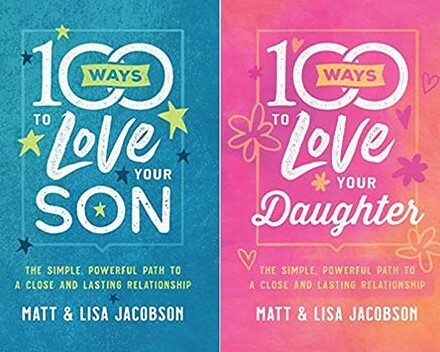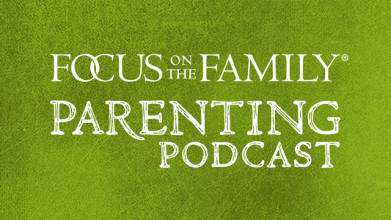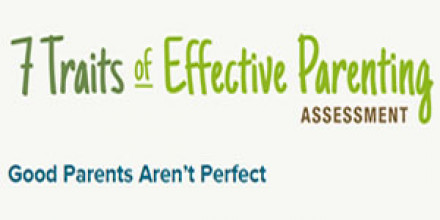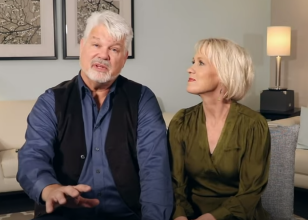Teaser:
Man #1: I show love to my girls really every morning. If they don’t come over to me to give me a hug, I will always go find them and give them a big daddy hug and a big daddy kiss on the head.
Woman #1: I have both a boy and two girls, and love looks very much like time. They enjoy time with me together, um, individually.
Man #2: My daughters are grown now, and so connecting is a little bit harder, but I try to pursue them, uh, to invite them over for dinner, or to call, or just send a text, I’m thinking of you.
End of Teaser
John Fuller: Well, I wonder if you resonate with those comments? You know, uh, loving our children is something that we as parents want to do, we try to do that well, but sometimes we need to, uh, lean in and be a little bit more intentional about how we show love to our children. Today on Focus on the Family we’ll review some great ideas about loving your sons and your daughters in ways that are meaningful to them. Uh, we’re so glad you’ve joined us. Your host is Focus president and author, Jim Daly, and I’m John Fuller.
Jim Daly: And John, I’ve always been, uh, man, so happy to love on my boys. I mean, it’s just part of what I love to do, giving them a hug, and I can remember my oldest, Trent, I mean, he was stiff as a board at five years old. I’d hug him, his arms would be down to the side, I’d say “No, go ahead, put your arms around my shoulders. Come on, give me a big squeeze, push my kidneys in,” you know, just to get him to go for it, because he was so, you know, it just felt odd to him, and, uh, I can say now he is one great hugger. I’m proud of that, but, uh-
John: (Laughs) Well, I’m glad you trained him.
Jim: You know, it is hard. Um, life gets busy, we get distracted, we’re not sure, you know, if they really need that anymore, but the, the right answer is who doesn’t need a hug? I mean, everybody needs a hug and I think your kids will need more hugs than you realize, and sometimes there’s misunderstandings, hurt feelings, you know, when we’re parenting. Have you said you’re a perfect parent, by the way?
John: Never.
Jim: Okay, good (laughing). I’ve oft-
John: [crosstalk 00:01:54] continually aware of my failures.
Jim: I’ve ov- often asked audiences when I’m speaking “Is there a perfect parent in here?” I think I’ve had one person out of tens of thousands of people that actually put their hand up, and I said “Okay, after we talk come on up, I want to ask you some questions.” They didn’t show up.
John: Oh (laughing).
Jim: Yeah, but that’s the point, this is just normal life and we want to help you today as a parent to love on your daughters, to love on your sons in ways that really, um, feed their confidence, their identity in Christ and all those good things.
John: Yeah, we, uh, have invited Matt and Lisa Jacobson to help us explore this a little bit more. Uh, they were here a few months ago talking about meaningful ways to show love to your spouse, and, uh, uh, shazam, there’s a follow-up, uh, meaningful ways to show love to your children. Uh, Matt is a teaching pastor and a marriage coach, Lisa encourages women, uh, to live more biblically and, uh, together they write and they speak on topics of marriage and parenting and, uh, Christian living, and they cohost a podcast called Faithful Life. Uh, the Jacobson’s have written a pair of books we’ll explore today, 100 Ways to Love Your Son, uh, also 100 Ways to Love Your Daughter: The Simple, Powerful Path to a Close and Lasting Relationship, and we’ve got copies of those books here at focusonthefamily.com/broadcast here at focusonthefamily.CA. Copies of those here, uh, just click the link in the episode notes.
Jim: Matt and Lisa, welcome back to Focus.
Lisa Jacobson: Thank you so much.
Jim: Good to-
Matt Jacobson: Good to be back.
Jim: Good to have you with us. Uh, now, I think we need to clarify upfront that you have, uh, experience in parenting, right? (Laughing)
Jim: How many kids do you have?
Lisa: We have eight.
Jim: Eight. And you have how many of which (laughs)?
Lisa: We have four and four. We planned it that way.
Jim: Well, how wonderful-
Matt: Yeah (laughs).
Jim: For you to balance it so well. You have a basketball team plus three substitutes.
Matt: Exactly (laughing).
Lisa: That’s right.
Jim: That’s perfect. Almost a baseball team. You’re a little short there.
Matt: Hey, we’re still working on it [crosstalk 00:03:44].
Jim: [crosstalk 00:03:44]-
Speaker 2: No, we’re not (laughing).
Jim: I love that. Oh, Jean and you would be fast friends, I can tell you, but let’s, uh, let’s get into it with, uh, just the simple idea of a busy household, uh, and it’s, you know, challenging to find that quality time, that quantity time, how did you guys do it with eight kids? I mean, where did you find that time to actually be with your children collectively and individually?
Matt: One of the things that, uh, I think we’ve learned in life is that everybody has time for their real priorities.
Jim: Mm-hmm (affirmative).
Matt: And so, in a busy house, and ac- actually I’ve not met anybody in the last 20 years that didn’t say they were so busy, right?
Jim: (Laughs) Isn’t that, that’s like a calling card about everybody-
Matt: [crosstalk 00:04:25]-
Jim: “I’m so busy.”
Matt: But you throw eight kids into the mix and it is very, very challenging, uh, just from a logistics standpoint, keeping the wheels on the wagon and-
Jim: Yeah.
Lisa: Yeah, just ordering our lives is, uh, helpful to, to run our family, that there’s order in our home, not a bunch of chaos. I mean, chaos comes with kids, but you also want to give them a sense that, that there is order, there’s peace in our home, and, and that’s, uh, that’s a priority for us.
Jim: How do, uh, but how do you, to get, get back to that question, how did you literally carve out time for each child? I mean, I, I didn’t do that well and I had two boys. I mean, I would do things together. Looking back on it, that was one regret that I’ve had, that, uh, you know, because two boys, we’d go to the baseball game together, we did everything together and I didn’t really understand the need to do some things individually just to build one on one time until in their teen years, and I do, that is one thing that I wish I would have caught earlier.
Matt: Well, that makes perfect sense, and I think everybody, no matter if you have a smaller family or a larger family deals with the exact same challenge, you know, “Wh- where is that one on one time with this child,” and you’ve just got to fight for it, because it will not happen naturally, everything in life conspires against it, which is why I started out by saying we always have time for our real priorities-
Jim: Yeah.,
Matt: And so sometimes as parents we have to sit down, take stock and really, uh, assess where our priorities are, because when we look at those kids as the disciples that God gave us to raise in the nurture and the admonition of the Lord, to raise to know who he is and what he likes, what he requires. It takes time to communicate that-
Jim: Yeah.
Matt: But it is the real priority for Christian parents.
Jim: You know, Matt, this may even sound a little outdated, but I’m thinking of th- the father, you know, the provider, I know women work outside the home and I get that, but that feeling of “Man, I’ve got eight kids I’ve got to feed.” Um, you start thinking about “I may not be here with you physically-”
Matt: Yeah.
Jim: “But know that I’m thinking about you, but I’m working my backside off trying to make sure we have food and shelter.”
Matt: Mm-hmm (affirmative).
Jim: I mean, you can hear men rationalizing that.
Matt: Well, absolutely, and part of that is just the truth. Uh, it, it takes-
Jim: Yes (laughs).
Matt: Like, our kids like peanut butter sandwiches. Well, you’ve got to, you’ve got to buy a lot of peanut butter. There’s, there are a lot of expenses that just go into maintaining the family, but there are so many practical things that you can do along the way, so if you have a little errand to run, grab a kid to go with you. It’s more efficient always just to do it yourself, put your head down and go to the hardware store and get what you need, so you kind of have to sacrifice a little bit of efficiency for what really matters, the hearts of your kids.
Jim: That’s so true (laughs).
Matt: Yeah.
Jim: Every guy’s grinning-
Matt: Yeah.
Jim: Because it’s so true.
Matt: So-
Jim: “Hey, I’m just going to sneak out and make sure I get those nails and a hammer.”
Matt: Exactly. Yeah.
Jim: “Why don’t you take the kids?” “Ah …” (Laughs)
Jim: But Lisa, let me ask you on that hugging setup I did in terms of-
Lisa: Mm-hmm (affirmative).
Jim: Uh, Trent. I mean, y- hugging was really important to you as, as one of your parenting tools. A lot of parents, you know, were just not taught how to engage that way, especially if you’re coming from a stoic, a more stoic family environment-
Matt: Mm-hmm (affirmative).
Jim: Where you guys talked about things but you didn’t show affection, maybe your mom and dad, you never s- saw them hug or kiss, um, you know, that, that’s not uncommon.
Lisa: Yeah, we weren’t, I grew up in a home that was not particularly affectionate, so this whole hugging, touching thing was very new to me, and I thought it would come more naturally as a mother, um, but it, it didn’t come naturally to me.
Jim: Yeah.
Lisa: Um, Matt’s family was way more affectionate that way, and so I, I learned a lot from him, but I also started seeing there was so much power, so even if it didn’t feel comfortable, my reaching out to my kids, touching them, hugging them, I could see them lighten up, I could see breakthroughs even-
Jim: Yeah.
Lisa: Um, and so the more I realized how powerful it was the more I was determined to do it, and now it’s very comfortable to me, um, and I enjoy it very much.
Jim: But it can be learned, that’s the thing.
Lisa: Mm-hmm (affirmative).
Matt: Absolutely.
Jim: You know, y- you don’t, you don’t have to stay in that place that distance is comfortable, you can learn to hug.
Jim: Now, I’ve got to ask you Matt, uh, as a father, uh, with four daughters, I mean, that’s part of it, a lot of dads will write to Focus or contact Focus, you know, once your kids hit a certain age, especially your daughters, it, you know, it’s kind of uncomfortable, how do you manage that whole side of that, um, kind of appropriate hug as Dad, and, you know, not, you know-
Matt: Well, you know, when you’re doing it for the first time, it doesn’t matter if you have eight kids, there are first times along the way-
Jim: Yeah.
Matt: Right? And so, I had to learn that with my daughters when they were transitioning to womanhood, they didn’t, th- that whole touchy-feely thing [crosstalk 00:08:50]-
Jim: They kind of pulled back a little bit.
Matt: They kind of pulled back a little bit.
Jim: Yeah.
Matt: I had to trans- uh, transition away from that, but the real core of it, uh, isn’t to check a box that “Hey, I touched this child today, I, uh, embraced this child today,” the real core of it is communicating that you actually like them as a person. Every parent loves their kids, right? “Oh, I love my kids.” Yeah, but do you like them? Do you think being with them?
Jim: (Laughs) Yeah.
Matt: Do you like their personalities?
Jim: Mm-hmm (affirmative).
Matt: Are they people that you value just because of who they are, not what they are going to accomplish or what they’ve done?
Jim: Well, that’s, it sounds like managing expectations to a degree. I mean, if you’ve got these incredibly high expectations, your son or daughter’s going to be a doctor, and they’re not very good at math or whatever, right-
Matt: Yeah.
Jim: Um, that starts to put little widgets in your relationship, little, um-
Matt: Absolutely.
Jim: Barriers, I guess.
Matt: Yeah.
Jim: And loving your child is like, uh, got to be like, uh, the unconditional love that we experience from the Lord. It should be, but it’s sometimes hard to do that as, uh, as a parent, right, because they’re behaving in ways, Lisa (laughing), that you know what, don’t make me very happy right now.
Lisa: Actually, I re- I remember a moment where my daughter who is teenage years, and she was just having an emotional meltdown, she was being totally ridiculous (laughing), and I was really frustrated in my spirit, like “What am I going to do with this child?” And I walked in the room and I was just trying to come up with the right words, the right lecture, and then something in me just said “Just go over and just hug her.”
Jim: Mmm (affirmative).
Lisa: And I didn’t know if she would get upset with me or if that would just make it worse, but I just did it anyway, and I just didn’t say anything and I just hugged her, and just right in my arms she melted.
Matt: Mm-hmm (affirmative).
Jim: You could feel it, right?
Lisa: I could feel it.
Jim: Just-
Lisa: I could feel the little girl in her-
Jim: Aww.
Lisa: Just-
Jim: That’s sweet.
Lisa: Just, you know, come down, and we did end up having a more reasonable conversation after that, but-
Jim: Yeah.
Lisa: And for the time there was no agenda, just “I’m here with you no matter how you’re feeling or what you’re going through.”
Jim: Yeah. You know, so often as parents we forget even though we went through it when we were teenagers-
Lisa: Mmm (affirmative).
Jim: That 13 to 17-year-old stage-
Matt: Mm-hmm (affirmative).
Jim: When that zit appears on your face-
Matt: Mm-hmm (affirmative).
Jim: And you’re going “It’s all falling apart! This is the end of the world! I can’t go to the dance, I’m never going to get married, I’m never going to have children.” I mean, you’re going “What?” That’s a good time to hug your child (laughing).
Lisa: Yeah, just high school.
Matt: Absolutely.
Jim: But, but it’s this perspective that you’ve got to be able to bring as the parent without judgment or, you know, just that wraparound to say “You know what, it’s, it’s not going to be that big a deal.”
Lisa: Mm-hmm (affirmative).
Jim: And that’s true of just about anything that goes on in that teenager’s life at that point.
Matt: Sometimes one of the most difficult things you can do, because you want to be efficient, you want to deal with the information, you want to go forward-
Jim: Yeah (laughing). I like you. [crosstalk 00:11:27]-
Matt: [crosstalk 00:11:27] got a plan here, [crosstalk 00:11:29].
Jim: I like you.
Matt: Yeah.
Jim: “Come on, snap, snap.”
Matt: And sometimes one of the most difficult things you can do is just sit and listen.
Lisa: Mm-hmm (affirmative).
Matt: And we’ve got a couple of kids, uh, they’re not all this way, we have a very silent son who, uh, you know, he doesn’t have much to say.
Jim: I’m sure you have variety with eight children.
Matt: We have a big variety.
Lisa: Yeah.
Matt: But there’s a huge value in valuing, and I say valuing because the parent has to see this in themselves, “I value this,” there’s a huge value in just listening to your daughter, to your son, listening to what they have to say, and we’re such fixers, and we listen to the problems and then three minutes in we’ve got the answer, uh, but that’s the wrong approach, certainly we’ve found in our kids, and I’m thinking of a couple of daughters in particular, but one in particular-
Lisa: Mm-hmm (affirmative).
Matt: Who just wants you to listen, and she’s not looking for your, your comeback answers and your, you know, awesome plans and solutions, she just needs to get it out.
John: Yeah.
Matt: She needs to. And so, it doesn’t feel very productive as a parent, but it’s super powerful-
Jim: Mm-hmm (affirmative).
Matt: In the heart of your child.
Jim: Yeah. Well, and so much of what you talk about in your great resources, 100 Ways to Love Your Son, 100 Ways to Love Your Daughter, uh, it’s, it’s the relationship, I mean, that’s what you’re really talking about.
Matt: Absolutely.
Jim: You in fact talk about dating your daughter.
Matt: Mm-hmm (affirmative).
Jim: I mean, that’s not, I didn’t have that experience. John, you, you did.
John: I did, yeah.
Jim: But I, I don’t have daughters, so I, I kind of, you know, there’s a piece of my heart going “Aw, I wish I would have had a daughter and experienced that.”
John: Yeah.
Jim: And, you know, said “Hey, let’s go out Wednesday night, every Wednesday night’s going to be your night, let’s spend time together.”
Lisa: Mmm (affirmative).
Jim: How did you do that?
Matt: Yeah. Well, f- first of all, with eight kids, um, you can’t just block out a night of the week, because-
Jim: You- you’re one short.
Matt: There aren’t enough nights (laughs).
Lisa: And there’s me (laughing).
Matt: That’s right.
Jim: Yeah, [crosstalk 00:13:11].
Matt: That’s right.
Jim: [crosstalk 00:13:14].
Matt: She, she always says “I’m high maintenance, but I’m worth it.”
Jim: I’m a Sunday through Saturday person.
Matt: But-
Jim: Yeah, that’s good.
Lisa: [crosstalk 00:13:20]-
Matt: But, uh, uh, I think I say this in the book, I wish I would have done this vastly more than I did, and there are a lot of dads out there that are doing an excellent job with this, but I, I did date our daughters, again, a little bit. I wish I would have done it a lot more.
Jim: Yeah.
Matt: There’s real value in just saying “Hey, I’d like to go catch some lunch with you.” We do it more now with, we’ve got several kids that don’t live near us-
Jim: Right.
Matt: But, but, uh, with our daughter that does and with our sons, we definitely pursue that more.
Jim: Spend a little more time together.
Matt: But it’s easy, um, just asking.
Jim: Yeah.
Matt: Just asking, and sometimes-
Jim: Mm-hmm (affirmative).
Matt: Your child will be surprised. You know, if you haven’t done it, they might be surprised, and, and if there’s a little bit of pushback don’t take the bait. If you’re starting in on this journey just do it, just show them that you like them, and you want-
Jim: Yeah.,
Matt: To be with them, you want them to be with you.
Jim: Well, it’s creating those opportunities to listen-
Matt: Absolutely.
Jim: Like you just said a moment ago.
Jim: Lisa, let- let’s turn to sons for a moment. I love this aspect that you wrote about in terms of, you know, lettings boys be boys in essence. So your kids, your boys-
Lisa: Mm-hmm (affirmative).
Jim: Love, it sounded like love to build forts, my boys did the same thing. You know, “Where’s the blanket? Where are the chairs? Oh, they’re in the basement, and they’ve got this fort going,” and it, you know, it’s a nice, uh, nice place to go hide really, but, uh, why is that important, to let boys be boys?
Lisa: Well, I think it, it speaks so powerfully into their lives. It builds confidence in them that they, that you can, that you love them just how they’re made and that you’re going to encourage that, so I had to, for me, I had to let go of some things. I had to let go of my need for order (laughing), um, my clean house, those are super important things to me-
Jim: Right.
Lisa: And, but I realized “Wait a minute, I am sacrificing how they’re made in order for me to be, have my home the way I want it to be.”
Jim: You had to let that go a little bit.
Lisa: Yeah, I did, and so, uh, I didn’t let them spread out all over the house, but-
Jim: Yeah.
Lisa: In the living room they would set up their tents, they would leave them up for days, they would bring all their stuff in there and eat in there, and-
Jim: (Laughs) Yeah.
Lisa: I’ve asked our older son, who’s now 26, “Like, uh, like what is it that we did right? What is it, some things that you felt like I did well?” And he said “I loved that you let us build forts in the house and that you let us just-”
Jim: Mmm (affirmative). A great memory.
Matt: Now, some, sometimes this can take a dangerous turn. So, our son, the 26-year-old, had one of these little action figures with a parachute attached to it-
Jim: Yeah.
Matt: And we had an upper room in the house we were at that had a railing, and so he’d go up there and he’d throw it off and watch it settle to the ground, and he starts thinking “I think I can do this.” So, he goes and gets a garbage bag-
Jim: Oh, no.
Lisa: Mmm (affirmative).
Matt: And he-
Jim: No, no, no.
Matt: And he’s, he’s standing at the top on the rail, and he’s just getting ready to jump onto this platform he had built with, with, uh, with cushions and everything, and then Grandma walked by and said “What are you doing?”
Jim: Yeah.
Matt: He said “Well, it worked. I saw the little, little, uh, guy,” and so he was just going to do that. I was like “Oh, man.” (Laughing)
Jim: Maybe a future engineer.
John: Yeah.
Jim: Maybe, if he lives.
John: [crosstalk 00:16:07]-
Jim: No kidding. Yeah.
Lisa: Yeah, they did some pretty crazy stuff.
Matt: Oh, yeah. So, you know-
Jim: Oh, that’s so good.
John: This is Focus on the Family. Today we’re talking to Matt and Lisa Jacobson. Uh, get a copy of their books, 100 Ways to Love Your Daughter, and the companion, 100 Ways to Love Your Son. Uh, it’s not rocket science, it’s good practical stuff. We’ve got those books here at the ministry. It’s focusonthefamily.com/broadcast or 800, the letter A and the word FAMILY.
Jim: Matt, you stress the importance of affirming your sons-
Matt: Mm-hmm (affirmative).
Jim: And I, I think I understand that, and I hope I’ve done a good job of that with my boys, but, uh, you’re coming from a place where you didn’t really have the well of affirmation-
Matt: Right.
Jim: And its wonderful how God works that pendulum.
Matt: Mm-hmm (affirmative).
Jim: You know, so much of our parenting, I think, if you’re aware and you’re tuned in, you will start to correct those things you didn’t have-
Matt: Yeah.
Jim: And I can so relate to that.
Matt: Yeah.
Jim: And, uh, it sounds like you had that similar experience.
Matt: Yes, absolutely. And while s- saying that as a young child I didn’t really have that affirmation from my dad or my mom, they did change later in life.
Jim: Yeah.
Matt: So there, there was a journey that they [crosstalk 00:17:10]-
Jim: Hey, we’re all growing.
Matt: They, they, they were all growing, but, uh, and again, this is one of those things where you say “Hey, is it that big of a deal,” you know, but, uh, but there’s so many opportunities through the day and it is a massively big deal for your son and your daughters to know that you approve of them. You approve of them. So, giving them affirmation for the things that they’ve accomplished, the things that they’ve done, or how they’ve acted toward another person if it’s, uh, in a good, constructive and Godly way. Every single day is filled with opportunities to affirm who they are and what they’ve done, and hey, we all know it’s filled with opportunities for training and discipline too, when they’re young especially, but the thing is, is that you are so powerful as a parent, and I know a lot of parents out there don’t feel powerful, they just feel like hey, their kids are, you know, moving on in life and the circle’s getting bigger and all of that, but your presence and your, uh, the validation that you can bring to the decisions that they make is so powerful. It helps them build confidence, it helps them know that you’re behind them, and every day if you just look around, what happened in your day-
Jim: Yeah.
Matt: And what, maybe they cleaned up all the bikes, uh, uh, off the driveway-
Jim: Mm-hmm (affirmative).
Matt: Uh, in a y- as a young kid. You know, our kids did a lot of wood chopping. In fact, I never even lit our fire once in the winter-
Jim: Yeah.
Matt: You know, for 10, 12 years, because they handled it, but affirming your kids, it’s so important.
Jim: And they didn’t burn the house down (laughs).
Matt: They didn’t burn the house down.
John: This is kind of like catching your children doing well.
Matt: Exactly.
John: I think a lot of us have a tendency to find out what they’re doing wrong and call them out on that-
Matt: Yeah.
Lisa: Mm-hmm (affirmative).
John: But you’re saying find them doing right and affirm them in that.
Matt: Absolutely.
Jim: Well, not only that, John, what was hi- hitting me is the experts will say try to do a 10 to 1 ratio.
John: Uh-huh (affirmative).
Jim: That sounds exhausting. You know, uh, meaning, not 10, uh, you know-
John: Negatives-
Jim: Negatives-
John: Yeah.
Jim: For every one positive, the opposite.
John: Sure.
Jim: For every, uh, you know, one negative, try to augment that with 10 positives.
Matt: And it can be a burden until you change your perspective on what you’re actually doing-
Jim: Right.
Lisa: Mm-hmm (affirmative).
Matt: An- and, and what you’re speaking into the life of your son or daughter.
John: Mmm (affirmative).
Jim: And that does speak life-
Matt: Yeah.
Jim: Into your son or daughter.
Matt: Absolutely.
Jim: That’s the big thing. Uh, Lisa, let me ask you again, I’m coming from no experience, just observing my friends, but with daughters, um, y- and you alluded to this, there was emotional moments, so many hormones changes are going both in sons and daughters, but girls seem to have the harder end of that just with hormone changes and development and all those things, and h- how do you manage all that, image, self-image, as a mom to a daughter how are you encouraging her to be solid in how she is no matter who she is?
Lisa: I thought our daughters would, because they did grow up in a solid, loving home, I thought they would just naturally be confident teenagers. I really did. I thought that would just fall into place, and so I was very surprised when my girls did struggle with self-image or wanted to know if they were pretty or if they were okay, and-
Jim: It kind of surprised you-
Lisa: It did surprise me. I actually-
Jim: Because you thought they had that.
Lisa: Yup.
Jim: What, what in a woman’s heart, in a girl’s heart is making that disconnect? Why, why are they so doubtful of what they are, who they are?
Lisa: I think it comes with the territory, but there’s also all the, there’s social media, there’s your peer influence, and then there’s just your own self-doubt, and they all come together somehow in that vulnerable time and just make a mess of your child’s heart, your daughter’s heart, and so as a parent, rather than that pulling away that we can do when they’re teenagers, like give them some, I, I’m not saying don’t give them space, but our girls have said to me “No, Mom, we needed you more than ever in our teen years. We needed you there to speak into our lives and in, in positive ways, not the, so much the lectures, just that ‘I believe in you, I love-‘”
Jim: (Laughs) Yeah.
Lisa: “’I love what you’re wearing.’”
Jim: Again, the affirmation.
Lisa: Yeah.
Jim: Y- Lisa, uh, let me delve into that a little bit, uh, and I don’t know if you’ve found a difference with each of your daughters, uh, I would think you did, because everybody’s uniquely made-
Lisa: Mm-hmm (affirmative).
Jim: But the quiet soul, I mean, you’re sitting there, you’re affirming, you’re hugging, you’re doing all those things to say “You matter to me-”
Lisa: Mm-hmm (affirmative).
Jim: And you get very little response, I know you’re going to say “Yes, stay motivated to keep going,” but you may have one of those quiet daughters that you’re not getting the, kind of the feedback loop to say “Oh, this feels good. Oh, thank you, Mom. That’s incredible. Mom, thank you.” You, you don’t typically get that.
Lisa: (Laughs) I definitely have one of those-
Jim: Yeah.
Lisa: For sure, and you’re right, you do just, you do it anyway. Um, recently I just wrote this same daughter, who’s now living out of the home, and I wrote her a letter just from my heart, because she was going through a really difficult time, and I had no idea if it would offend her, I didn’t know if she would throw it out, I had, I just kind of mailed it to her, and, uh, she texted me one word, she said “Mom, I got your letter, I cried.”
Matt: Yeah.
Jim: Mmm (affirmative).
Lisa: And I just thought “Praise the Lord.”
Jim: Yeah.
Lisa: “I am so glad. So, it did mean something to you, even if you aren’t as expressive as some of our other girls.”
Jim: Well, let me ask you for that mom and dad, but how do you stay motivated? You know, we have our needs too emotionally, and if we don’t feel a response coming or it’s minimal we can tend to trail off in those positives things, so how do we stay motivated when you’re not getting the feedback? How, how do you stay there?
Lisa: I think, can think of a couple things, and one is you, you want to keep your long-term perspective. I, I know what kind of relationship I want with this child when they are in their 20s, in their 30s and, uh, and on, so I k- I try to keep that in mind, and Matt and I actually encourage one another privately in the back bedroom, like “Ugh!” (laughing), and then we kind of give each other-
Jim: Could we hear more about that?
Matt: Yeah (laughing).
Jim: You know, how does that go?
Lisa: We do give each other a little bit of cheering, like “No, let’s just keep at it-”
Matt: Yeah.
Lisa: Or “It’s your turn.” We do some of that between us too.
Matt: And you have to be re-reminded of things-
Lisa: Mm-hmm (affirmative).
Matt: And one of the big ones in this matter of dealing with a child that’s maybe pulling back a little bit and maybe even saying some things that you go “Hey, wait a minute,” you know, but you need to remember not to take the bait, because then what you wind up doing is being engaged at the, the same level, right? And, and we’ve had our kids come back to us now, our older kids, and they’ve said “Hey, I really appreciated how you pushed me there. I really appreciated how you [crosstalk 00:23:02]-”
Jim: So they noticed?
Matt: Yeah, as adults in the world-
Lisa: Mm-hmm (affirmative).
Jim: Yeah.
Matt: Now they’re coming back around to some of these things that, uh, you look at in the moment and you go “Hey, what’s happening? Is this positive?” But the main thing is, don’t take the bait, just remember who the adult in the room is.
Jim: Yeah.
Matt: And it’s hard, because we do have feelings as parents-
Lisa: Mm-hmm (affirmative).
Matt: And here, this child that we poured, you know, 15, 16, 17, 18 years into is now saying hurtful things or doing hurtful things. Don’t take the bait, just keep praying. Don’t, don’t me-
Jim: (Laughs) do you think-
Matt: Engage on an emotional level.
Jim: The Lord said that when, uh, Adam and Eve were disobedient? (Laughing) Was he saying “Okay, don’t take the bait.”
Matt: “Don’t take the bait.”
Lisa: That’s [crosstalk 00:23:36]-
Jim: I mean, isn’t that funny?
Matt: Absolutely.
Jim: I mean, he created, you know, he’s perfect, he’s a perfect everything-
Matt: Mm-hmm (affirmative). Yeah.
Jim: And here he had these two creations, you know, his people going, uh, in a different direction-
Matt: Yeah.
Jim: Battling against him. I’m sure he had a little thing going there. He’s going “Okay, what did I do?” (Laughing)
John: Well, we obviously enjoyed our conversation with Matt and Lisa Jacobson today on Focus on the Family as we reviewed their great ideas about how to love your son or daughter in really meaningful ways.
Jim: Uh, John, Matt and Lisa have provided us with some simple yet profound reminders about what’s most important in our families today, and we can’t afford to get distracted by the busyness of life and forget to listen to our kids or hug them on a regular basis. I try to do that. Uh, we need to encourage them and affirm them in who God created them to be, and I like what you said earlier, John, “This isn’t rocket science.” We can all learn how to love our children better, and that’s why I really appreciate these books by Matt and Lisa. 100 Ways to Love Your Son, and 100 Ways to Love Your Daughter. Both books are easy to read, and chock full of fun ideas and encouraging stories, and we can put either into your hands, uh, for a gift of any amount today to Focus on the Family. That’ll be our way of saying thanks for partnering with us to strengthen and support families.
John: Call today to donate and request your copy of 100 Ways to Love Your Son or 100 Ways to Love Your Daughter. Our number is 800-A-FAMILY, 800-232-6459 or online we’re at focusonthefamily.com/broadcast, and, uh, you probably know this, but just in case, Focus on the Family has a lot of resources to benefit your family, including a free online parenting assessment which can give you a general overview of what’s working well with your kids and offer some suggestions about ways that you can improve that relationship.
Jim: And that’s why Focus on the Family exists, uh, to equip moms and dads to be the best parents they can be, and thanks to the generous support of so many friends like you, we’ve been there when families needed us the most, and the like the woman who wrote to us a while ago, and let me just add, this is to you, the donor and support base, uh, this letter is written to you as much as it is to us. “After our second child was born, the strong willed one, God brought us to our knees and my husband accepted the Lord. Our lives began anew, and Focus led the way.”
John: Mmm (affirmative).
Jim: “When we had no church support to guide or disciple us, you were there. Your godly advice helped me parent my children alone while their father was deployed, and then helped him learn to be a good dad once he came home again. Through the years, your teaching about relationships has strengthened our marriage and pulled us together in our desire to please God. For all these things we are forever grateful.”
John: Mmm (affirmative).
Jim: Man, that is so good, and let me add my thanks to everyone who has partnered with us financially to empower and help families like that one, uh, and if we haven’t heard from you, uh, for a while or if you’ve never given to Focus, can I encourage you to consider supporting the ministry today?
John: Yeah, your donation helps make stories like that one possible, and we’d love to hear from you. Again, our number is 800-A-FAMILY, and you can contribute on the website focusonthefamily.com/broadcast. We’ll hear more from Matt and Lisa Jacobson next time about loving your children well.
Matt: We all have these deep, wonderful feelings for our children, right, but they’re not worth anything if we don’t actually communicate to them-Those deep wonderful feelings.
John: On behalf of Jim Daly and the entire team, thanks for joining us today for Focus on the Family. I’m John Fuller inviting you back next time as we once more help you and your family thrive in Christ.
























